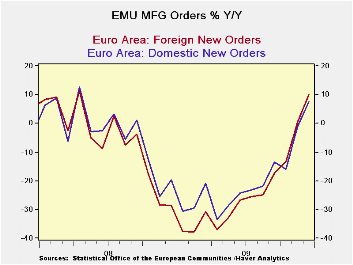 Global| Feb 24 2010
Global| Feb 24 2010Orders Continue In Their Upswing
Summary
Manufacturing orders are up by 0.8% in December but the sequential growth rates do not show that the growth of orders continues to accelerate. MFG sales are also slowing as capital goods and intermediate goods sales rates over three- [...]

Manufacturing orders are up by 0.8% in December but the sequential growth rates do not show that the growth of orders continues to accelerate. MFG sales are also slowing as capital goods and intermediate goods sales rates over three-months are weaker than sales rates for six months
In December domestic orders have been especially strong rising by 6.1% while foreign orders advanced by 2.2%. But over three months Domestic orders are up at just a 0.8% rate while foreign orders are up at an 11.9% pace. The pattern of growth rates in the chart shows us that domestic and foreign growth rates peaked about six months ago and have since been slowing down even though they continue to grow. This is one reason for concern about whether the recovery is building momentum or not.
Among large EU/EMU countries Italy and the UK are demonstrating still accelerating orders from 12-months to six months and again from six months to the three-month horizon. In France orders accelerated in six months compared to 12-months and have stayed near that mark for 3-month growth rates. Germany shows a decided deceleration with growth rates rising in six-months compared to 12-months then submerging and going negative for the recent three-month period. Still the Yr/Yr growth rates moved sharply higher in December compared to November everywhere but in the UK. But the sequential growth rates do give more of an up-close view of growth and on that basis momentum truly is fading.
Obviously the various EU/EMU countries have some differences. But the overriding message is that orders growth is slowing. It is still positive but it is slowing. Europe now will be burdened with the growing and festering problems of Greece and possibly other debt ladened e-Zone members. The European consumer does not seem to have gotten in gear. The recent German IFO survey was weak but it may have been impacted by weather. We are always on a bit of a weather watch at this time of year. But apart from weather there are ample trends that tell us to be cautious about depending on the European recovery being too strong.
| Selected Euro-Area and UK Industrial Orders | |||||||||
|---|---|---|---|---|---|---|---|---|---|
| Saar except m/m | Mo/Mo | Dec 09 |
Nov 09 |
Dec 09 |
Nov 09 |
Dec 09 |
Nov 09 |
||
| Euro-Area Detail | Dec 09 |
Nov 09 |
Oct 09 |
3Mo | 3Mo | 6mo | 6mo | 12mo | 12mo |
| MFG Orders | 0.8% | 2.7% | -2.1% | 5.6% | 9.2% | 16.9% | 21.5% | 9.5% | -3.2% |
| MFG Sales | -0.4% | 1.4% | 0.4% | 6.1% | 4.3% | 8.8% | 7.9% | -2.8% | -9.2% |
| Consumer | 0.7% | 1.0% | -0.2% | 6.1% | -3.4% | 3.7% | -0.4% | -2.6% | -5.3% |
| Capital | -1.9% | 0.5% | -0.4% | -7.2% | 6.4% | 5.1% | 5.8% | -5.7% | -10.3% |
| Intermediate | 6.1% | 1.3% | -6.8% | 0.8% | 4.1% | 18.6% | 20.0% | 7.7% | -1.1% |
| Memo:MFG | |||||||||
| Total Orders | 0.8% | 2.7% | -2.1% | 5.6% | 9.2% | 16.9% | 21.5% | 9.5% | -3.2% |
| E-13 Domestic MFG orders | 6.1% | 1.3% | -6.8% | 0.8% | 4.1% | 18.6% | 20.0% | 7.7% | -1.1% |
| E-13 Foreign MFG orders | 2.2% | 3.0% | -2.3% | 11.9% | 35.2% | 20.8% | 34.2% | 10.0% | 0.4% |
| Countries: | Dec09 | Nov09 | Oct09 | 3Mo | 3Mo | 6mo | 6mo | 12mo | 12mo |
| Germany (MFG): | -1.8% | 3.2% | -2.1% | -3.4% | 9.9% | 10.3% | 23.7% | 4.2% | -2.0% |
| France(Ind): | 17.1% | 0.5% | -8.2% | 36.4% | -7.3% | 40.5% | 4.5% | 15.5% | -4.2% |
| Italy (Ind): | 4.7% | 2.9% | 0.7% | 38.5% | 47.6% | 18.5% | 15.4% | 5.3% | -3.5% |
| UK (Engineering Industy): | 8.5% | -15.6% | 14.1% | 19.1% | -18.1% | 7.1% | -9.9% | -16.2% | -3.8% |
Robert Brusca
AuthorMore in Author Profile »Robert A. Brusca is Chief Economist of Fact and Opinion Economics, a consulting firm he founded in Manhattan. He has been an economist on Wall Street for over 25 years. He has visited central banking and large institutional clients in over 30 countries in his career as an economist. Mr. Brusca was a Divisional Research Chief at the Federal Reserve Bank of NY (Chief of the International Financial markets Division), a Fed Watcher at Irving Trust and Chief Economist at Nikko Securities International. He is widely quoted and appears in various media. Mr. Brusca holds an MA and Ph.D. in economics from Michigan State University and a BA in Economics from the University of Michigan. His research pursues his strong interests in non aligned policy economics as well as international economics. FAO Economics’ research targets investors to assist them in making better investment decisions in stocks, bonds and in a variety of international assets. The company does not manage money and has no conflicts in giving economic advice.
More Economy in Brief
 Global| Feb 05 2026
Global| Feb 05 2026Charts of the Week: Balanced Policy, Resilient Data and AI Narratives
by:Andrew Cates






